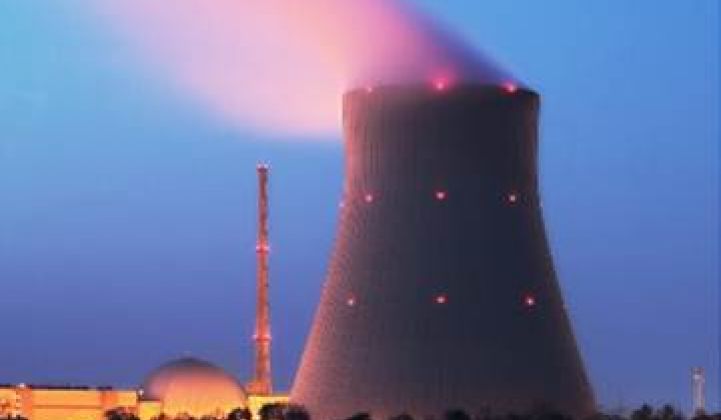A sign of the nuclear industry’s difficult situation in the aftermath of Fukushima is a proposal before the Iowa legislature that would allow utility MidAmerican Energy Holdings, a subsidiary of Warren Buffett’s Berkshire Hathaway, to build a new nuclear facility in the state using Construction Work in Progress (CWIP) financing (also called advanced cost recovery).
“Investment in nuclear power is the antithesis of the kind of investments you would want to make under the current uncertain conditions,” explained nuclear industry authority Mark Cooper, a senior fellow for economic analysis at Vermont Law School’s Institute for Energy and the Environment. “They cannot raise the capital to build these plants in normal markets under the normal regulatory structures.”
CWIP would allow the utility to raise the money necessary to build a nuclear power plant by billing ratepayers in advance of and during construction.
“Construction Work in Progress was intended to circumvent the core consumer protection of the regulatory decision-making process,” Cooper explained. “It exposes ratepayers to all the risk.” The nuclear industry’s answer to its post-Fukushima challenges, he said, “is to simply rip out the heart of consumer protection and turn the logic of capital markets on their head.”
The Staff of the Iowa Utilities Board concurred with Cooper. Its recommendations to the legislature followed his arguments in "Nuclear Socialism Comes to the Heartland of America," his most recent paper on nuclear economics. In it, Cooper found that CWIP could increase average utility bills as much as $70 per month “before any power is generated by the reactors.”
His message to policymakers is simple, Cooper said. “This is an investment you would not make with your own money. Therefore, you should not make it with the ratepayers’ money.”
CWIP exposes ratepayers to all the risks inherent in nuclear energy, Cooper explained. "It gives the utility certain guaranteed returns, which they would never have, and distorts the utility incentives.”
An example of incentive distortion is “the sunk-costs argument” now being used by Southern Company for the Vogtle reactors under development in Georgia with CWIP financing. Construction there is reportedly both behind schedule and over budget. Southern Company, Cooper said, is arguing that, with as much as $4 billion in sunk costs, “It’s cheaper to finish this project than to start something else.”
Some nuclear developers, he added, will simply tell regulators that have authorized the spending of billions in ratepayer funds, “If you don’t give me the next $50 million, I’m going to abandon this project.”
Vogtle has just been licensed by the Nuclear Regulatory Commission (NRC), causing a stir among environmental activists. To Cooper, the NRC’s decision on Vogtle was “a non-event” because, he said, “The morning after the license was issued, nobody on Wall Street woke up and said, 'Hey! Now I’m going to buy in!'" The licensing decision had, he said, “no effect on the economics.”
More significantly, he added, the Obama administration has not advanced the Vogtle $8.33 billion federal loan guarantee that has been on hold since last year because of the budget and schedule problems.
“The Obama administration talks about nuclear power,” Cooper said, “but it has stopped putting the people’s money where their mouth is.”
Georgia is one of four Southeastern states that were convinced in the 2006 to 2007 period by nuclear industry lobbying to allow CWIP financing for nuclear plants. Of five projects, Cooper said, the only one that is “seriously moving forward” is Vogtle.
It demonstrates, Cooper said, what it takes to build a nuclear project today. “A massive amount of subsidy, the federal loan guarantee, construction work in progress and muni partners who also don’t raise funds in normal capital markets but are backed by the full faith and credit of municipalities,” he summarized. In addition, Cooper said he believes Westinghouse, the reactor manufacturer, is subsidizing the project in its own self-interest.
Cooper pointed out that renewables are an economically viable alternative to nuclear power. “They always say it’s hard to do renewables and it’s hard to convince people to do efficiency,” he explained. “But then they always assume it’s easy to build nuclear. And it’s not.”
“Base load,” Cooper said, “is so 20th century.” Given “the sum total of the tools we have for integrating resources and managing the grid,” he explained, “it is time for utilities that are not transitioning to grow up and adopt some new technology.”
Cooper disagrees that small modular reactors, the next generation of nuclear technology, are an answer to future power requirements. “It is not clear to me that the safety concerns are solved because you are smaller,” he said. “Certainly the cost concerns are not.” And, with smaller reactors that promise to efficiently recycle nuclear waste, he said, “you shrink the output much faster than you shrink the cost of safety.”
Any utility could come forward “with a proposal to build a reactor,” he said. And if the numbers are right, “the public utility commission will approve. But they can’t do that. It doesn’t exist.”
He suggested to Iowa legislators, he noted, that they “pass a nuclear development fund” to advance small modular reactors but “they wouldn’t do it.” What they wanted to do, he said, is use “the ratepayer to make risky venture capitalist investments in technologies that are completely unknown. That’s not what you should be doing with ratepayer money.”



